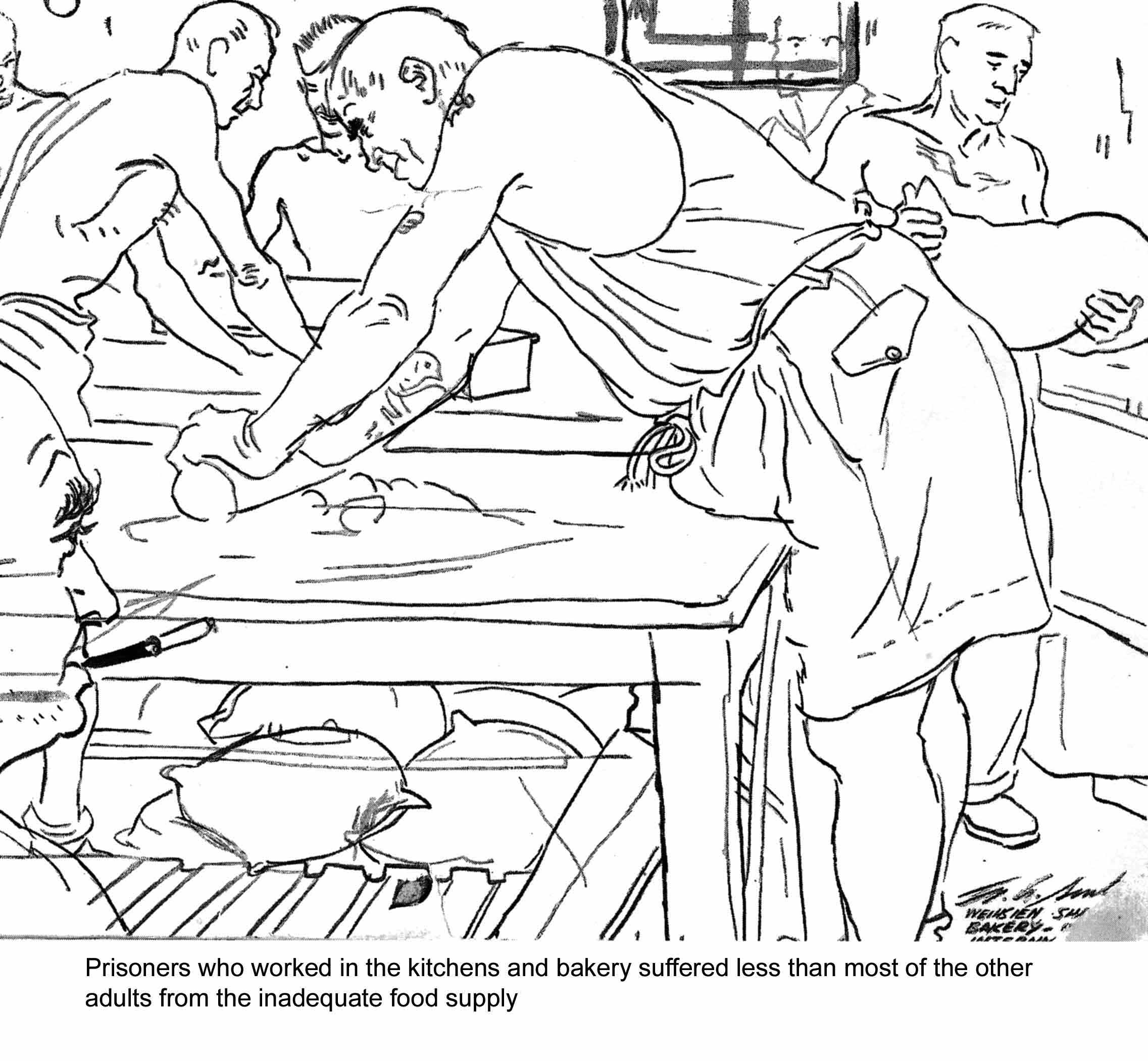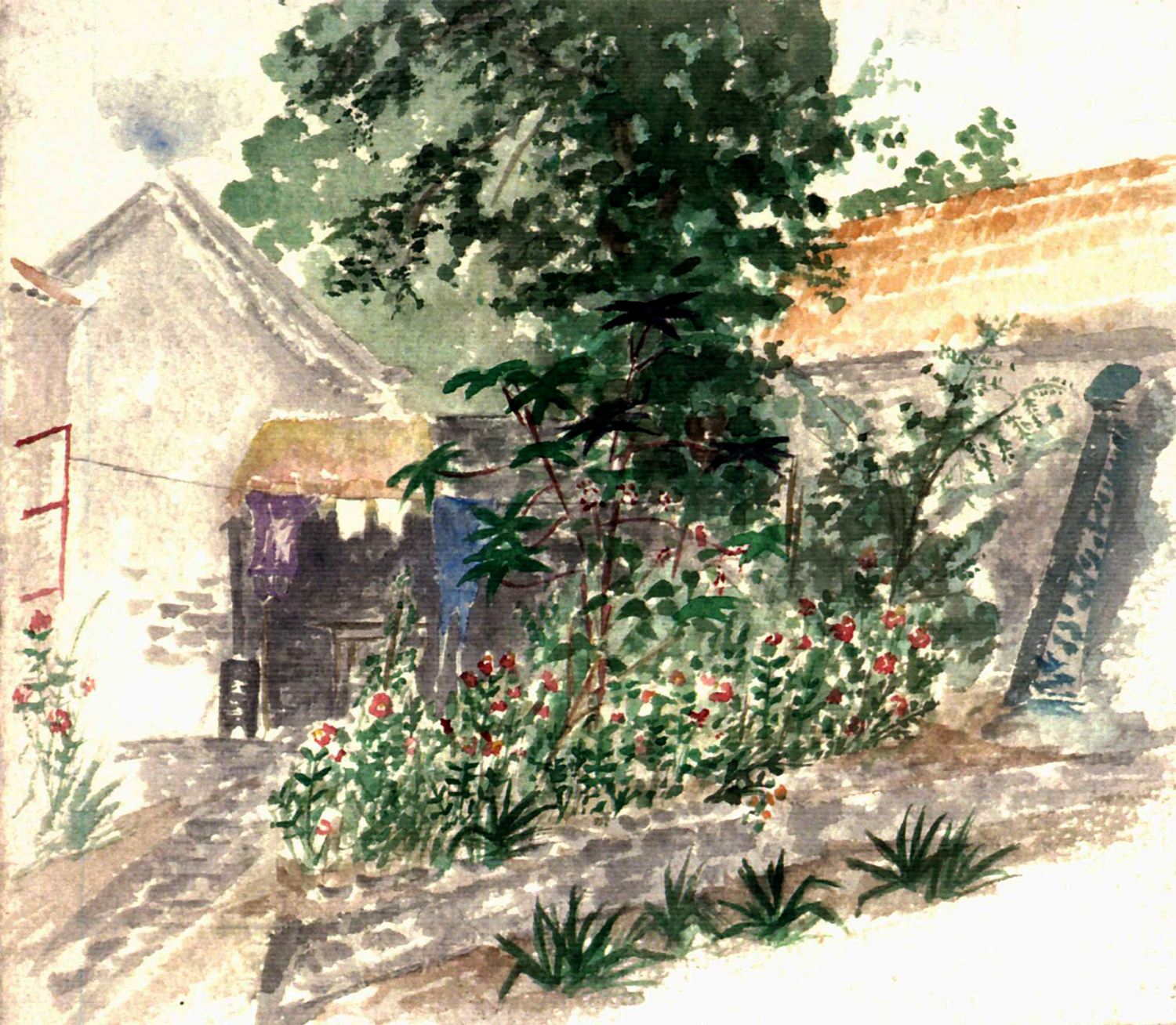
" The Butcher,
the Baker,
the Stoker ... "
By JOSEPH F. JANNING, S.M.
February 1944
The Passionists are able to do anything.
They are versatile in their accomplishments.
They are handy about the home, or, in this case, better say the prison camp.
They can butcher, they can bake, they can cook, they can stoke fires. Yes, and more than that, for they can play ball, and play the game as no others can. They are gentlemen and splendid priests of God. They are missionaries one and all. God has blessed the Passionist Missionaries in China with outstanding abilities; they have used their gifts to win souls for Christ.
Back in 1921 the first Passionists came to China. These valiant pioneers of God have labored persistently and heroically in the foreign field that is China, The first Passionist Missionaries plugged into the work of the missions though they were terribly handicapped by the lack of fluent Chinese.
Still they labored on.
Some of them won the crown of martyrdom.
As the years rolled on the pioneers gradually settled down to look over the harvest, they had gathered: they likewise planned for the future.
They resolved to give their young and newly arrived missionaries the unique chance of spending a year or two in Peiping, North China, to go to school and study Chinese. It is these patient language students, and their Superior, who were caught in the maelstrom of the present Japanese war and sent en bloc to a concentration camp at Weihsien, Shantung.
An internee in a concentration camp is a prisoner pure and simple.
I was one in the Weihsien camp and know whereof I write.
But I will speak little of that phase of the picture. The brighter lights of prison life are so much more interesting.
Clearly do I recall a casual remark made by one of my companion prisoners as we were lined up, labelled with a large-sized number, examined, and ordered ready to march to an unknown prison camp. My friend remarked: "No matter where an American finds himself, even on a desert island, he will know how to be happy and to help himself."
The Passionists in the Weihsien, North China, Civilian Assembly Center — don't let the euphonic name mislead you — lived true to form as Americans and men of God. They were happy and knew how to help themselves by helping others.
There was Father Leo Berard, a stalwart man, a hearty missionary.
For many years he labored in the mission field and directed a seminary in Yüanling, Hunan. In 1941 he was sent by his Provincial to Peiping to be the Superior of the Passionists' house of studies.
Father Leo bore the brunt of seeing his young missionaries taken away from his control and sent into a prison camp.
Of course he went along ― with a smile on his face and a prayer in his heart. He did not stop there. He gave of his best and in camp volunteered to be a baker.
 His job was to help in the making of two thousand pounds of bread every day. Many nights he came out of the overheated bakery — where more than one had fallen, overcome by heat — to his small, overcrowded room, close to midnight.
His job was to help in the making of two thousand pounds of bread every day. Many nights he came out of the overheated bakery — where more than one had fallen, overcome by heat — to his small, overcrowded room, close to midnight.
The next morning, long before six, he was standing before God's altar piously and reverently reading Holy Mass. The altar was nothing but a small table: the place a corner of the camp.
His missionary spirit urged him on to other tasks of kindness.
On free evenings he sought out men and women anxious to know some of the simple truths of religion. With these he spent many hours. Some baptisms followed. Other results are chalked off in heaven.
"In a Monastery Garden" sounds like a poetical title for a musical composition but it is prosaic when you toil and sweat as Father Leonard Amrhein did among his tomato plants, corn stalks, melon vines, tobacco plants that wouldn't grow, and the flowers in his camouflaged V garden. You have seen his picture in THE SIGN before. He is tall, erect, cheerful, good to look at ― even when his smiling countenance is not …

… adorning the pages of the magazine.
Father Leonard did not stop with his garden work, but found occupation everywhere in camp, hauling coal, splitting wood, cleaning roads, even digging ditches and cesspools — just every kind of work the Employment Committee thought he should do. He did it with a smile and looked for more.
No prisoner ever asked him in vain for a helping hand.
Every book written on the life of a saint tries its best to give as true and as elevating a picture of the man as is humanly possible. That is the picture your mind should develop for Father Linus McSheffrey. You will find the positive in the unwritten book: "Weihsien Camp Life."
Mission life is no sinecure. Father McSheffrey understood and understands this better than many another. Yet, when his name was posted on the Camp Employment Bulletin as butcher, he donned a thin cotton apron, took up his long butchering knife and carved the beast into chunks that finally found the broad way that inevitably led into the good old daily stew.
Just imagine Father Linus — well proportioned, very sedate, always spotlessly clean, a student of books — a butcher.
He did his job well.
His kind, winning personality became known, his influence grew from day to day among his fellow prison butchers; for all that, throughout the camp.
I saw many unmistakable signs on those with whom he came in contact. He worked with them, he must have prayed for them. He was slowly carving a picture of human and divine love deep into their souls.
Father Aloysius O'Malley and Father William Whelan are the finest men you ever want to meet.
Detailed to hard labor as stokers and boiler men, they were daily blackened with coal dust from head to foot. Their lot was, to shovel coal, stoke the fires, dispense boiled water at all hours of the day from early morning till late at night.
Many a morning they had to start their Holy Mass before schedule. Many an evening, they came home — what a home it was! ― after dark, dead tired and dirty. But that was only on the surface. You could see the smiles breaking through the sweaty black grime. You could hear their inward joy bubbling forth in song as they brushed the perspiration from their brows.
Nor did these two genuine Yanks forget their baseball.
Every holiday found them playing on the Padres' Baseball Team.
Father O'Malley held down third and "Willie" became the hero of the camp with his superb pitching. He carried the Padres to the top rung of the ladder of fame, and in the final "Camp Series" won four out of five games.
They played good ball, to be sure. And such a clean play it was, that all the boys in the camp swarmed around the heroes.
Do you imagine their work as missionaries suffered in consequence?
I know better.
One man of thirty-odd years said to me one day: "Gee,' I never knew that Catholic priests could play ball. They're just the swellest guys I ever knew."
Just before I left camp there were some very interesting private talks between our two missionary baseball heroes and this man. I know of many other similar cases.
And the last is the best of all.
Meet Father Johnson, the cook. Did he take good care of us?
Just listen to the words of praise that come from the five hundred men, women, and children from every walk of life that sat at the tables prepared by Father Johnson.
Now, the Weihsien Camp was made up of some 1,800 people: business men and professional men, active and retired folks, laymen and missionaries, Catholic and non-Catholic.
Kitchen Number Three, over which Cook Johnson presided, had 500 of the 1,800 inmates and a rough cross section of all the above-mentioned categories.
Cook Johnson's job it was to please five hundred hungry, overworked prisoners. He did it. How? I will not dare to answer that question fully.
He did it. Five hundred voices of praise cannot be wrong. And yet he had to do it with practically nothing. He made porridge out of stale bread; he made pancakes for five hundred hungry mouths out of stale bread; he begged for spices and found them in the most unlikely places.
Cook Johnson served to please. He won the people's hearts through their stomachs. And didn't Christ feed the hungry and so win their souls?
These men and priests of God are still in China.
They were healthy and cheerful when I left them last September.
I feel sure they are still healthy and happy; for an American can find joy and happiness even on a desert island. 'The Passionists being missionaries besides have long since learned how to find consolation and joy in the deep recesses of the Heart of God and in that most faithful image of His Heart which is the Heart of Mary, our Mother in sorrows and tribulations.
#


P.S.
If you open Greg Leck’s book: “Captives of Empire” on page 667, you will read that:
Joseph F. Janning was repatriated to the USA in September 1943.
Father Leo Berard, Father Leonard Amrhein, Father Linus McSheffrey, Father Aloysius O’Malley, Father William Whelan and father Johnson were all transferred to Peiping in August 1943 to make place in the camp which was oversaturated at the time. After all these transfers were done, the Chefoo kids & staff came in !
#






